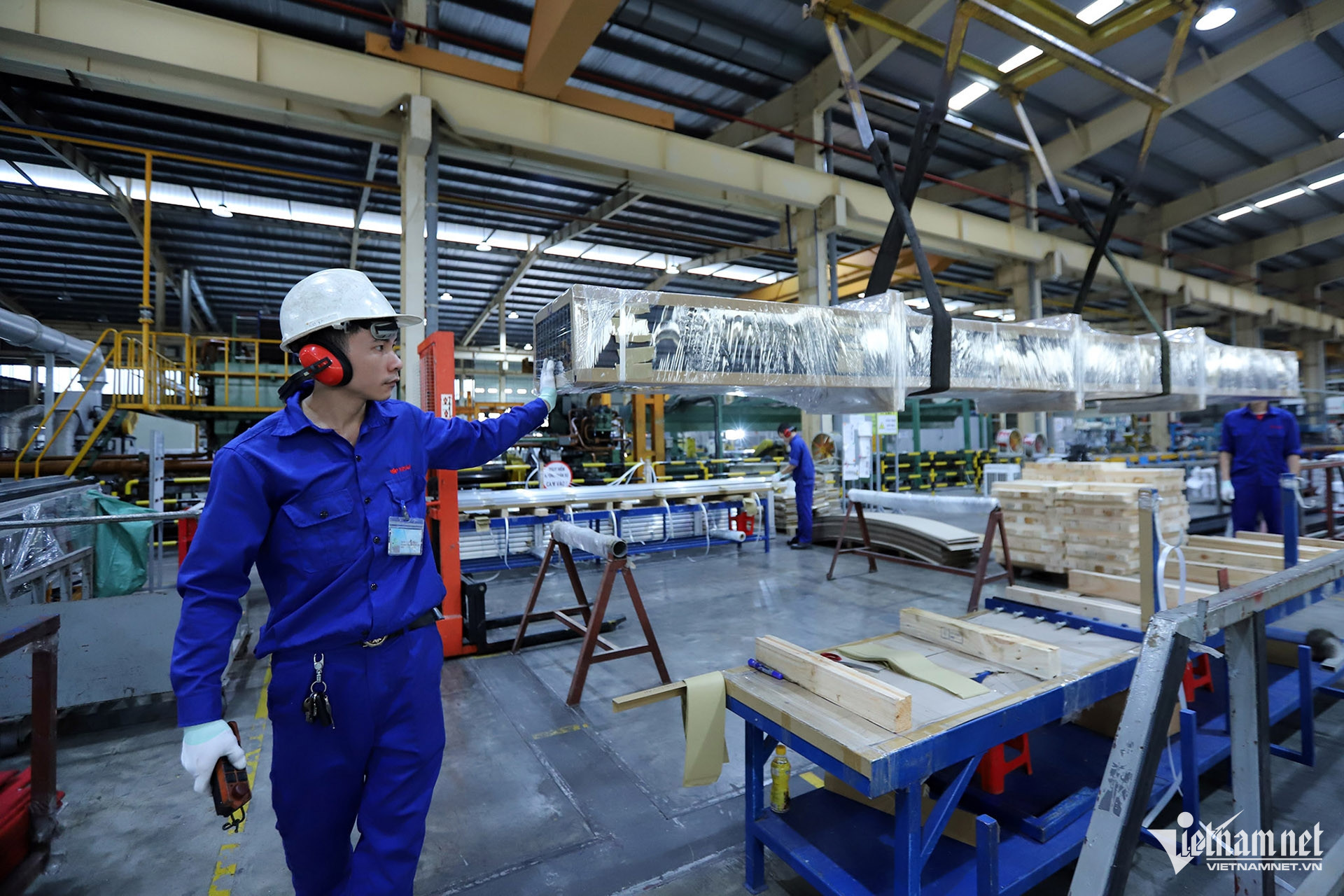The nearly 40-year journey of renovation has marked a resilient, breakthrough, and development-aspiring Vietnam. From a centrally planned, inefficient economy with a per capita income of just 96 USD in 1989, Vietnam has risen strongly and is expected to join the group of upper-middle-income countries by the end of 2025, with an income exceeding 5,000 USD per person per year. This remarkable achievement is not only the result of the Party’s correct development path—marked by bold and decisive reforms in institutions, policies, and integration—but also the fruit of the industrious labor, creativity, determination, and relentless efforts of the entire nation.
Even more impressive is that Vietnam’s economic growth rate has consistently been twice the average of developing countries, despite global economic fluctuations. From a poor economy reliant on international aid, Vietnam has made continuous, powerful breakthroughs to become the 24th largest economy in the world in terms of purchasing power parity (PPP). These achievements extend beyond the economic sphere, encompassing significant social progress that contributes to an increasingly prosperous and happy life for the people.

Developing the Private Economy: A Long-Term National Strategy
This success owes much to the vital contribution of the private economic sector. In the early stages of renovation, the private economy played a secondary role, with the economy largely dependent on the state sector and foreign direct investment (FDI). However, over the past two decades—particularly following the Politburo’s issuance of Resolution 09 in 2011 and the Central Committee’s Resolution 10 in 2017 on developing the private economy—this sector has risen powerfully. It has become one of the economy’s most critical pillars and increasingly proves itself as the primary driving force for national economic growth.
With nearly one million enterprises and approximately 5 million individual business households, the private economic sector currently contributes about 51% of GDP, over 30% of the state budget, and creates more than 40 million jobs—accounting for over 82% of the total labor force in the economy—while contributing nearly 60% of total social investment.
The private economy not only expands production, trade, and services but also plays a key role in enhancing labor productivity, fostering innovation, and boosting national competitiveness. The strong emergence of many Vietnamese private enterprises has enabled them to dominate the domestic market and establish their brands internationally. This demonstrates that, with a favorable development environment, Vietnamese enterprises can go far and compete fairly on the global stage.
A prosperous economy cannot rely solely on the state sector or foreign investment; it must depend on the internal strength of a robust private sector that takes a pioneering role in innovation and national development. The national economy can only truly thrive when the entire population engages in labor to create material wealth, in a society where everyone is enthusiastic about work.
Despite its growing contributions, the private economy still faces numerous barriers that hinder its development and prevent it from achieving breakthroughs in scale and competitiveness. Many individual business households cling to outdated practices, lack the motivation to evolve into enterprises, and some even “do not want to grow.”
The majority of Vietnamese private enterprises are small or micro-enterprises with limited financial resources and management capabilities. They lack connectivity among themselves and with the FDI sector, have not fully capitalized on the opportunities of the Fourth Industrial Revolution, and are slow to adopt digital transformation. Very few invest in research and development (R&D) or focus on innovating business models, technologies, or creating new products. As a result, it is challenging to increase added value, enhance competitiveness, elevate enterprise value, and meet international standards.
Beyond these internal limitations, private enterprises face significant obstacles in accessing resources—particularly credit capital, land, natural resources, and high-quality human resources, especially in technology, engineering, and finance. Meanwhile, some state-owned enterprises hold substantial resources, including land, capital, and skilled personnel, yet fail to utilize them effectively, sometimes even wasting them.
Additionally, the legal system remains riddled with inconsistencies and overlaps, the business environment is fraught with obstacles, and administrative procedures are complex, time-consuming, costly, and risky. In many instances, the rights to free enterprise and property are violated due to the incompetence or abuse of power by certain officials.
Moreover, government incentives and support policies are neither fully effective nor equitable across economic sectors and are often difficult for the private economy to access. State-owned and foreign enterprises frequently receive more favorable treatment—state enterprises enjoy easier access to land, capital, and credit, while foreign enterprises benefit from better support in taxes, customs procedures, and land access. The persistence of harassment and informal costs further burdens private enterprises, reducing production and business efficiency and fostering hesitation in expanding investments.
Clearly, the developmental constraints of private enterprises stem partly from deficiencies in the economic institutional framework, policies, and business environment. These bottlenecks not only stifle the private sector’s growth—leaving its GDP contribution stagnant for over a decade—but also hinder the economy’s ability to increase added value, escape the middle-income trap, and delay Vietnam’s transformation into a developed, high-income country by 2045, as outlined in the Party’s resolutions and the people’s aspirations.
The Private Economy as a Pioneering Force in the New Era
In alignment with the nation’s overarching vision, the private economy must clarify its mission and goals. It should be the pioneering force in this new era, successfully driving economic industrialization and modernization, enhancing national competitiveness, embracing social responsibility, improving people’s lives, contributing to a civilized and modern society, and building a dynamic, internationally integrated Vietnam.
The private economy must strive to become the leading force in technology adoption and innovation, aiming to contribute approximately 70% of GDP by 2030. An increasing number of private enterprises should achieve global competitiveness, master technology, and integrate deeply into global value and supply chains, working alongside the nation to create a dynamic, independent, self-reliant, and prosperous Vietnam.
To enable the private sector to fulfill this mission and realize this ambitious vision, the most critical factor is continued breakthrough reforms in institutions, policies, and the business environment. These reforms will allow the private economy to maximize its potential and lead the economy onto the global stage.
A thriving economy cannot depend solely on the state sector or foreign investment; it must rely on the internal strength of a robust private sector that pioneers innovation and national development. The national economy will only truly prosper when the entire populace participates in labor to generate material wealth, in a society where everyone is eager to work.
To meet this demand, we must reinforce the political system’s understanding and perspective on the private economy’s role as a top driver of national growth. This requires a fundamental shift in policymaking, overcoming limitations, and leveraging the strengths of the market mechanism to support the private sector in boosting labor productivity and innovation.
We must eliminate group interests in policymaking and resource allocation, ensure nondiscriminatory treatment between the private sector, state-owned enterprises, and foreign-invested enterprises in all policies, and uphold the principle that “everyone has the right to freely conduct business in industries not prohibited by law.” Policies must reassure investors, enterprises, and entrepreneurs, fostering strong trust between the state and the private sector to encourage bold investment, innovation, and participation in strategic economic areas.
The state must adopt management practices aligned with market mechanisms, safeguarding the rights to free enterprise, property ownership, and fair competition for the private economy. This includes removing all barriers, enhancing policy transparency, eliminating group interests in policymaking and resource allocation, and ensuring equitable treatment across all economic sectors.

Photo by Hoang Ha
The upcoming Politburo resolution on the private economy should encourage, support, and guide its development, creating a breakthrough momentum and ushering in an era of ascent for Vietnamese private enterprises. Developing the private economy must be recognized as a long-term national strategy and policy. Together with the state and collective economies, the private economy forms the core foundation for building an autonomous, self-reliant, and resilient economy. In which, focus on implementing the following key solutions:
1. Completing Market Economy Institutions
Continue accelerating the establishment of a full market economy institution, oriented toward socialism, that is modern, dynamic, and integrated. This is a prerequisite for the private sector’s rapid and sustainable development.
To achieve this, the state must focus on stabilizing the macroeconomy, refining institutions, ensuring the economy operates on market principles, minimizing intervention, and eliminating administrative barriers and the “ask-give” mechanism. The economy should be managed according to market principles, using market tools to regulate it.
In particular, strict controls must be placed on monopolistic enterprises and policy manipulation, protecting fair competition and ensuring equal opportunities for private enterprises. The core of perfecting market economy institutions lies in clearly defining the state’s role—focusing on macroeconomic regulation, creating a favorable business environment, ensuring effective market mechanisms, and upholding social justice. Promoting the private economy’s development must be a central task at this time.
2. Protecting Property and Business Rights
Effectively protect property rights, ownership rights, business freedom, and contract enforcement for private enterprises. A key function of the state in a modern market economy is safeguarding investors’ property rights. Thus, the state must establish and enforce a rigorous legal framework to protect property rights—including intellectual property and intangible assets—while minimizing legal risks and abrupt policy changes that harm enterprises.
Mechanisms must be created to support and protect private investors, especially startups and innovative enterprises, fostering confidence and smooth development. A modern, socialist-oriented market economy requires a transparent and effective contract enforcement system to instill confidence in commercial transactions and investments.
This requires reforming the commercial judicial system, shortening dispute resolution times, reducing costs and risks for enterprises, and addressing unenforced contract violations. The transparency and efficacy of economic courts and commercial arbitration must be enhanced to ensure fair and objective rulings, enabling enterprises to defend their legitimate rights.
Law enforcement oversight must be strengthened to address inconsistencies between central and local levels, with strict penalties for officials abusing inspections to harass enterprises, thereby boosting investment and supporting private sector growth. Simultaneously, enterprises violating laws must face resolute action, while being encouraged to enhance legal compliance, build values, and uphold business ethics for healthy development.
3. Building Globally Competitive Private Conglomerates
While strongly consolidating the state-owned enterprise sector—especially economic groups—the state must prioritize developing private economic conglomerates of regional and global stature, actively supporting small and medium enterprises, nurturing the household and cooperative economies, and encouraging private enterprises to engage in strategic national fields.
The state should establish mechanisms and policies to assign and commission the private sector to participate in key national projects and urgent tasks, such as building high-speed railways, urban railways, energy infrastructure, digital infrastructure, and the defense and security industries.
The perspective that the private economy is a vital component of the socialist-oriented market economy must be practiced, eliminating the bias of “favoring the public over the private” and the monopolistic tendencies of state-owned enterprises in certain sectors.
Large, strong private economic groups with international competitiveness should be formed and developed, tasked with leading and supporting other domestic enterprises to integrate deeply into global value chains. Simultaneously, tailored policies must support small and medium enterprises, household economies, and cooperatives, encouraging business households to transition into enterprises and develop new, effective cooperative models.
To ensure the private economy grows not only in scale but also contributes positively to long-term national development, private enterprises should be encouraged to participate in strategic sectors, including critical infrastructure, high technology, key industries, and energy security. Opportunities for private enterprises in major national projects should be expanded, allowing collaboration with the state in strategic industries and special fields, while enhancing research and technological innovation capabilities.
4. Promoting Startups, Innovation, and Digital Transformation
Promote a wave of startups, innovation, digital transformation, and new technology adoption. This is a critical factor in enabling the private economy to break through and reach international levels. Strong, effective support policies are needed to encourage private enterprises to apply technology, innovate products, and increase added value.
The state should create regulatory sandboxes for emerging technology fields, encouraging private enterprises to invest in pioneering areas such as artificial intelligence, blockchain, big data, e-commerce, fintech, and smart healthcare.
Capital mobilization channels for private enterprises should be developed, including the stock market, corporate bonds, venture capital funds, credit guarantee funds, and modern financial tools like fintech and crowdfunding. Stable, transparent land policies must be established to facilitate affordable and convenient access to land for private enterprises.
Financial support policies and tax incentives should be implemented for enterprises investing in R&D. A robust startup ecosystem must be formed, creating conditions for Vietnamese startups and “tech unicorns” to achieve global stature.
5. Reforming Institutions for a Service-Oriented Administration
Reform institutions to create an administrative system that “serves enterprises and the nation.” Institutional reform must be resolute, based on innovative thinking to overhaul the administrative system toward serving people and enterprises. This includes decisively cutting administrative procedures and business conditions, accelerating digitization and technology application in state management to reduce time, compliance costs, and informal costs. Effective policy dialogue and feedback mechanisms must be established, enabling the private business community to contribute to economic policymaking with high practicality and feasibility.
The goal is to place Vietnam’s business environment in the top three in ASEAN within the next three years.

Photo by Hoang Ha
6. Maximizing Development Resources for the Private Economy
Maximize development resources for the private economy, creating opportunities for effective access to critical resources such as capital, land, human resources, and technology.
The private economy’s deeper integration into the global economy should be promoted, elevating Vietnam’s international economic standing and protecting enterprises from economic risks. More effective support policies are needed to ensure the private economy can access resources conveniently, fairly, equitably, transparently, and efficiently, optimizing their use.
Capital mobilization channels should be developed, including the stock market, corporate bonds, venture capital funds, credit guarantee funds, and modern financial tools like fintech and crowdfunding. Stable, transparent land policies must facilitate affordable and convenient access to land funds.
The state should guide and effectively support Vietnamese private enterprises in joining global supply chains, attracting substantial investment capital and advanced technology, and cultivating a cadre of entrepreneurs with global mindsets.
In particular, policies should encourage and guide private enterprises to invest in processing, manufacturing, supporting industries, agricultural industrialization, and high technology, rather than overly focusing on real estate and short-term speculative sectors. Mechanisms and policies must be built to shield private enterprises from economic shocks, especially amid global instability, recessions, and market volatility.
7. Sustainable Development with Ethics and Social Responsibility
Develop the private economy on a sustainable foundation, rooted in business ethics and social responsibility. The state should promote private sector development based on macroeconomic stability, closely tied to green development strategies, circular economy principles, resource conservation, emission reduction, and environmental protection.
Private enterprises must proactively fulfill social responsibilities, going beyond financial contributions or charity to adopt responsible business policies, care for workers’ lives, support community development, and practice transparent, effective management. A business culture based on ethics, anti-fraud measures, and fairness to customers, partners, and employees should be cultivated.
Additionally, private enterprises should actively participate in social welfare programs alongside the state, contributing to improved social welfare, reduced wealth gaps, and the creation of a civilized, humane, and beautiful society where enterprise benefits align with the nation’s collective prosperity.
The private economy plays a pivotal role in shaping Vietnam’s economic future. We firmly believe that with appropriate institutions, sound policies, and a favorable business environment, the private economy will be nurtured to grow robustly and break through powerfully. This will not only drive high economic growth but also transform Vietnam into a high-income economy within the next two decades. Now is the time to act—to build a prosperous, dynamic Vietnam that increasingly reaches out to the world.
We are living in a historic moment, witnessing unprecedented advancements in science and technology amid a volatile international environment of both cooperation and competition, where opportunities and challenges coexist. Yet, with resilience, determination, and burning aspiration, Vietnam can absolutely create new miracles in socio-economic development!
A strong economy is taking shape, driven by a generation of courageous, innovative, and creative Vietnamese entrepreneurs brimming with business zeal and patriotism. They are continuing to write Vietnam’s success story. A bright future—a socialist Vietnam standing shoulder to shoulder with the world’s powers, as envisioned by President Hồ Chí Minh—is gradually becoming a reality in the near future.
By General Secretary Tô Lâm
Source: vietnamnet.vn
